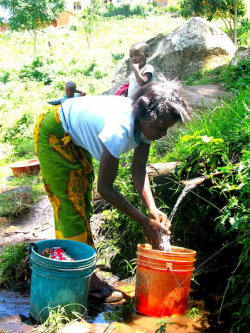Water, hygiene and sanitation

Rural woman fetching water for domestic use
A core challenges that Tanzania has to take up in terms of development is water due to the lack of access to safe water of 54% of the population. Water is central in many areas such as poverty reduction, food security or human health.
Regarding poverty reduction, water plays an essential role in Kilimanjaro region, because the availability of water reduces time spent on fetching water, a burden especially for women and children. Furthermore, the sustainable access to drinking water and an adequate sanitation system decrease waterborne diseases such as diarrhea and cholera, both very common in our region.
KIHO identifies tow major strategic areas, access to safe drinking water and adequate sanitation services. Today, we work in the implementation of rain water harvesting systems in primary schools in Same district and the development of water gravity supply systems and the installment of watersheds managements in the Pare mountains.
Water scarcity, in other words more water is demanded tan available in agriculture is also a challenge in Kilimanjaro region due to the application of poor irrigation systems and the dependence on irregular weather patterns. One of the biggest challenges is the impact of climate change that leads to uncertainty of rainfall in this area. Thus, agriculture is adversely affected by periodical droughts, a fact that complicates successful harvests and even leads to crop failure.
KIHO is committed to promote sustainable practices that increase the irrigation water availability and satisfy the agricultural water demand. Due to the lack of water, we currently support rural communities to restore the old unreliable irrigation systems to increase the efficiency of water use by avoiding leakages and have water available throughout the year, including the dry seasons.
Finally, KIHO concentrates on awareness-creation concerning the sustainable use of every drop of water. In fact, we believe in the necessity to strength the governance capacity of local communities to ensure a universal, equitable and sustainable access to water, as an essential self-management key in water management.
KIHO tries to ensure sustainable access to safe drinking water and basic sanitation and also makes a small contribution to achieve the seventh Millennium Development Goal until 2015. Our current areas are:
Regarding poverty reduction, water plays an essential role in Kilimanjaro region, because the availability of water reduces time spent on fetching water, a burden especially for women and children. Furthermore, the sustainable access to drinking water and an adequate sanitation system decrease waterborne diseases such as diarrhea and cholera, both very common in our region.
KIHO identifies tow major strategic areas, access to safe drinking water and adequate sanitation services. Today, we work in the implementation of rain water harvesting systems in primary schools in Same district and the development of water gravity supply systems and the installment of watersheds managements in the Pare mountains.
Water scarcity, in other words more water is demanded tan available in agriculture is also a challenge in Kilimanjaro region due to the application of poor irrigation systems and the dependence on irregular weather patterns. One of the biggest challenges is the impact of climate change that leads to uncertainty of rainfall in this area. Thus, agriculture is adversely affected by periodical droughts, a fact that complicates successful harvests and even leads to crop failure.
KIHO is committed to promote sustainable practices that increase the irrigation water availability and satisfy the agricultural water demand. Due to the lack of water, we currently support rural communities to restore the old unreliable irrigation systems to increase the efficiency of water use by avoiding leakages and have water available throughout the year, including the dry seasons.
Finally, KIHO concentrates on awareness-creation concerning the sustainable use of every drop of water. In fact, we believe in the necessity to strength the governance capacity of local communities to ensure a universal, equitable and sustainable access to water, as an essential self-management key in water management.
KIHO tries to ensure sustainable access to safe drinking water and basic sanitation and also makes a small contribution to achieve the seventh Millennium Development Goal until 2015. Our current areas are:
- Drinking water supply (including roof-top rainwater harvesting).
- Hygiene and sanitation.
- Promotion of efficient irrigation system.
